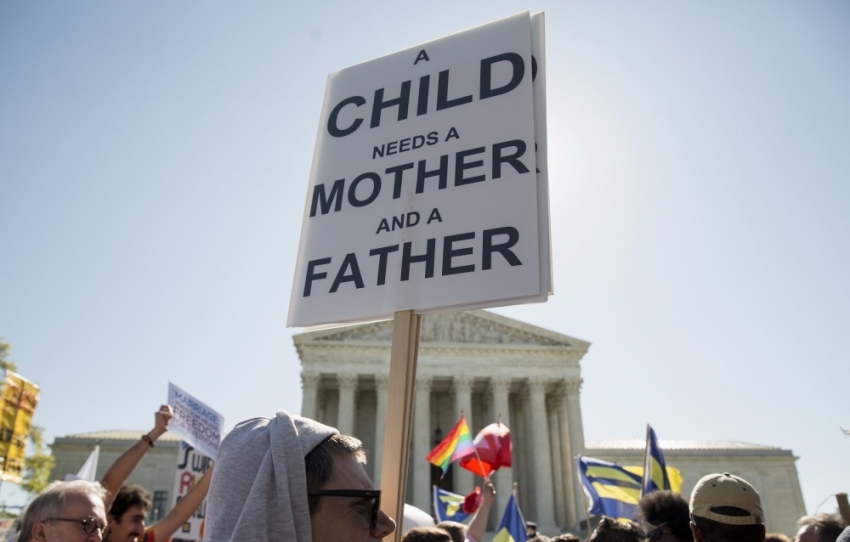Analysis: Could the Supreme Court Compromise on Gay Marriage?

One line of questioning during Tuesday's oral arguments on gay marriage before the U.S. Supreme Court suggests a "wild card" compromise as one possible outcome.
While court watchers expect the usual five to four, liberal/conservative split on the court, with Justice Anthony Kennedy being the deciding vote, another possible outcome is a compromise led by Chief Justice John Roberts.
There are two questions before the Court in Obergefell v. Hodges: 1) Does the Fourteenth Amendment require a state to license a marriage between two people of the same sex? 2) Does the Fourteenth Amendment require a state to recognize a marriage between two people of the same sex when their marriage was lawfully licensed and performed out-of-state?
There are three possible outcomes when the court decides in June: 1) Yes to both. 2) No to both. 3) No to the first question and yes to the second question.
As Roberts pointed out during oral arguments, yes to the first and no to the second is not a possible outcome. If states must recognize same-sex marriages, they must also recognize them from other states.
Outcome three would mean that states do not have to issue marriage licenses for same-sex couples, but they would have to recognize marriage licenses issued to same-sex couples in other states. Since same-sex couples who live in states without gay marriage could travel to another state to obtain a marriage license, this outcome would mostly be a victory for those who support redefining marriage to include same-sex couples.
Most court watchers expect Kennedy to either join the court's four liberals for outcome one, or join the court's four conservatives for outcome two.
Outcome three is the wild card. Oral arguments did suggest that at least two Justices, Roberts and Anthony Scalia, were considering outcome three. With Kennedy clearly conflicted, he may willingly to go along with a compromise. Those three justices would still need at least two more justices for a majority, however.
According to Scotusblog, legal experts who were live blogging during the oral arguments, Kennedy seemed torn. He said he had "a word on his mind ... and that word is millennia" because the definition of marriage has not changed for millennia. On the other hand, he said that state marriage laws were meant to provide "dignity" to couples, so same-sex couples, and their children, would be denied dignity if not a allowed a state marriage license.
Scotusblog's Kevin Russell noted that both Roberts and Scalia asked some questions regarding how states should view marriage licenses from other states.
The issue revolves around the meaning of the U.S. Constitution's Full Faith and Credit Clause (Article IV, Section 1), which states, "Full faith and credit shall be given in each state to the public acts, records, and judicial proceedings of every other state."
Some of the justices asked whether a marriage license counts as either a public act or record, Russell wrote.
If the Supreme Court were to go with the "wild card" decision, it would not be the first time that Roberts would surprise court prognosticators. In 2012 he sided with the court's four liberals in upholding the Affordable Care Act's individual mandate.
Where, though, would the other two votes come from for a "wild card" majority? The other two conservatives, Justices Samuel Alito and Clarence Thomas, might join to prevent outcome one. Also, one of the court's liberals, Justice Stephen Breyer, seemed concerned that the lawyer for the plaintiffs did not adequately answer the question of why the court should overturn an institution that has been maintained for most of human civilization.



























